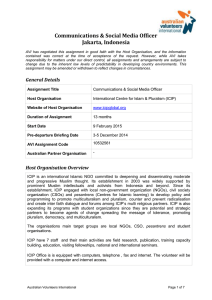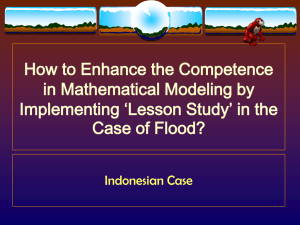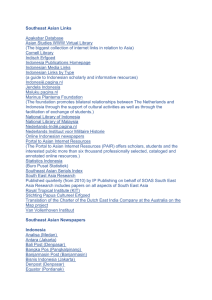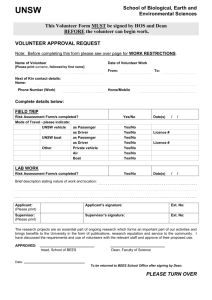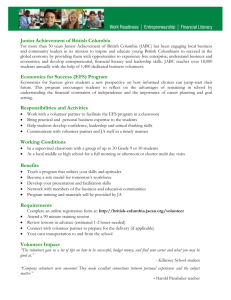Host Organisation Overview - Australian Volunteers International
advertisement
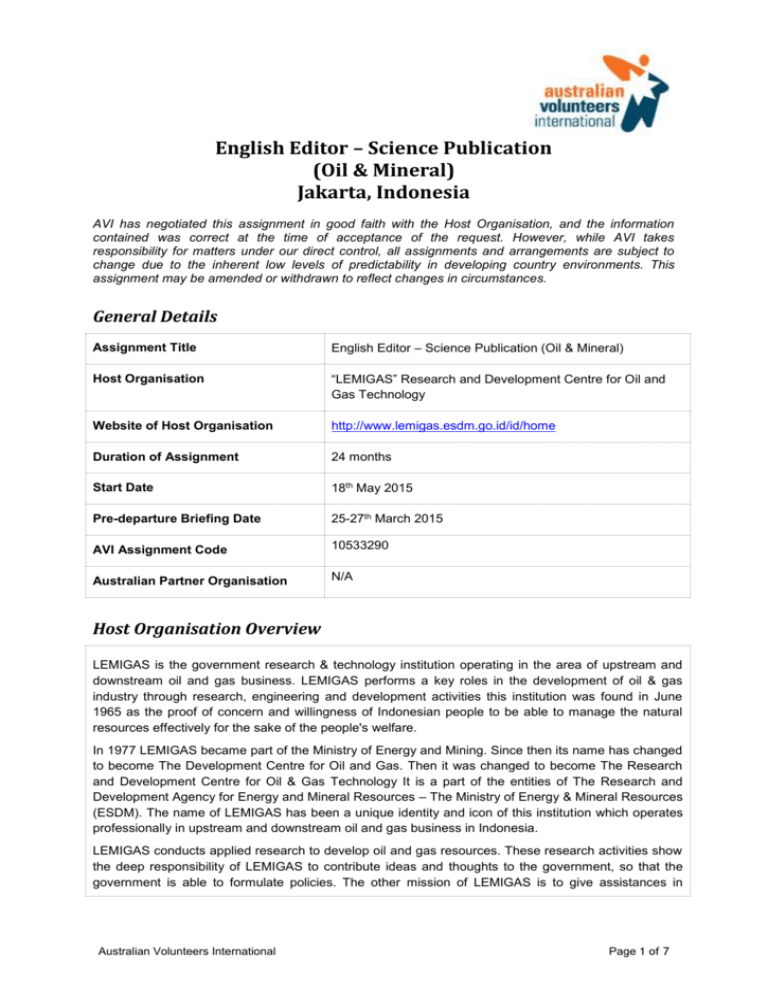
English Editor – Science Publication (Oil & Mineral) Jakarta, Indonesia AVI has negotiated this assignment in good faith with the Host Organisation, and the information contained was correct at the time of acceptance of the request. However, while AVI takes responsibility for matters under our direct control, all assignments and arrangements are subject to change due to the inherent low levels of predictability in developing country environments. This assignment may be amended or withdrawn to reflect changes in circumstances. General Details Assignment Title English Editor – Science Publication (Oil & Mineral) Host Organisation “LEMIGAS” Research and Development Centre for Oil and Gas Technology Website of Host Organisation http://www.lemigas.esdm.go.id/id/home Duration of Assignment 24 months Start Date 18th May 2015 Pre-departure Briefing Date 25-27th March 2015 AVI Assignment Code 10533290 Australian Partner Organisation N/A Host Organisation Overview LEMIGAS is the government research & technology institution operating in the area of upstream and downstream oil and gas business. LEMIGAS performs a key roles in the development of oil & gas industry through research, engineering and development activities this institution was found in June 1965 as the proof of concern and willingness of Indonesian people to be able to manage the natural resources effectively for the sake of the people's welfare. In 1977 LEMIGAS became part of the Ministry of Energy and Mining. Since then its name has changed to become The Development Centre for Oil and Gas. Then it was changed to become The Research and Development Centre for Oil & Gas Technology It is a part of the entities of The Research and Development Agency for Energy and Mineral Resources – The Ministry of Energy & Mineral Resources (ESDM). The name of LEMIGAS has been a unique identity and icon of this institution which operates professionally in upstream and downstream oil and gas business in Indonesia. LEMIGAS conducts applied research to develop oil and gas resources. These research activities show the deep responsibility of LEMIGAS to contribute ideas and thoughts to the government, so that the government is able to formulate policies. The other mission of LEMIGAS is to give assistances in Australian Volunteers International Page 1 of 7 solving problems occurring in the oil and gas industry. LEMIGAS’ strong commitment to carry out its missions is shown by the invaluable program for the country to manage the development of Coalbed Methane (CBM) to obtain new energy for the people; Biodiesel Plant for alternative fuel; and Lube Oil Blending Plant. LEMIGAS manages a Gas Demonstration System as well as which is useful for simulating gas transportation system from its sources to the last users. The capabilities of LEMIGAS in conducting research and development of upstream and downstream of oil and gas business have provided invaluable, unique and strong capacity to be used by any parties in the area of oil and gas business. The organisation’s mission is; To increase the role of LEMIGAS in providing input to the government and increase a conducive climate for oil and gas development, To increase the quality of R&D services and provide added value to the clients To increase output of superior products and develop mainstay products The main target groups / beneficiaries of LEMIGAS are; Government, e.g. Ministry of Energy and Mineral Resources; Oil Companies Local Government, e.g. oil and gas producing regions Overseas Institutions related to R&D for oil and gas activities, e.g. ASEAN, UEA, Asia Pacific (Korea, Japan, China) Universities Other related R&D institutions LEMIGAS’ main activities are; Research and development carried out by LEMIGAS covers the fields of exploration and exploitation, refining process, the industrial uses of oil and gas technology. There are seven main programs of R&D on oil and gas: 1. Identifying new hydrocarbon reserve and resources; 2. Enhanced hydrocarbon recovery; 3. Enhanced added value of hydrocarbons; 4. Conservation of oil and gas; 5. Alternative fuels; 6. Environment protection; 7. Materials technology. LEMIGAS have over 700 people (government & temporary employees) working for the organisation. The LEMIGAS Office complex is a well-resourced and modern facility. The work place has an English Laboratory, existing class room and 24 hours for internet access, IT equipment, resources, transportation access to support this necessity and work place, also has strong mobile network coverage. Australian Volunteers International Page 2 of 7 Assignment Overview As a leading Public Service Agency for oil and gas research centre, our institution needs a native speaker who can teach English to our 818 staff. After following the English program, the employees are expected to be able to communicate with their clients very well and also to be able to run their related tasks requiring English language in LEMIGAS excellently. This English program might be very useful to increase their services and hospitality to their clients. LEMIGAS has experienced hosting AVI volunteer in 1984-1986. The previous the volunteer worked as an EFL Teacher. The assignment meets the Program strategy for investing in people - to improve education quality, access and governance. Assignment Objectives To provide editing and translation services to LEMIGAS to improve the research centre’s capacity to produce and publish English language versions of its research papers, publications reports and proposals. To increase the capacity of staff, including editors and translator, to write and edit English reports through training, development of English writing manuals, and discussions with staff during the writing process. Duties and Responsibilities of the Volunteer In consultation with their line manager and relevant stakeholders, volunteers complete a work plan in the first three months of their assignment. The duties below are an indication of the type of work that may be involved in meeting the Assignment Objectives: Coordinate with LEMIGAS researchers and other LEMIGAS staff during the preparation of draft translating & editing process of documents to address issues related to meaning and content. This will involve working directly with research staff and other staff who are authors of specific documents. Checking, editing and repairing articles written in English on any scientific publication in LEMIGAS Assist the English Language Teacher in language training of LEMIGAS staff, increase editors’ English editing and translation skills or other publication related skills. Hold ongoing English editor workshops at LEMIGAS (on topics such as editing, translation, presentation, etc) Assist in the preparation of English writing and language manuals for LEMIGAS staff Train and mentor colleagues in the use and delivery of the English writing and language manuals Assist in conducting staff interviews and assess their English language levels Provide input into staff reports and development plans Assignment Information Line Manager Head of General Affair Division Staff supervision At times, certain aspects of the assignment will require the volunteer to work closely – either in an advisory or supervisory role – with counterparts. It should be noted though that the volunteer will not manage other staff. Australian Volunteers International Page 3 of 7 The volunteer will interact with staff, particularly with Personnel Affairs, Scientist and Affiliation and Information division. Hours & Days of employment From 8 am to 4 pm, Monday to Friday. The expectation is that the volunteer will work the equivalent of a 5 day week to a maximum of 40 hours per week. Leave entitlements Same conditions and terms as local colleagues apply, including national holidays. However, as a minimum, volunteers will accrue 1 week of leave for each 3 months of work. Other Conditions There will be the occasional meeting / workshop on weekend and or evening after 4pm or if needed by management related to the assignment. Language skill and level required Ability to converse about non-technical or technical matters (Medium to High). Language support The volunteer will receive one month intensive language training prior to commencing their assignment. The volunteer also can apply for further language training support up to a maximum of AUD 400. Living as a Volunteer The LEMIGAS Office complex is a two to six storey building, housing various departments and divisions. It is located on the street of Ciledug Raya in south Jakarta area and close to the central business district of Jakarta. Jakarta (also DKI Jakarta), is the Capital and largest city of Indonesia. It was formerly known as Sunda Kelapa (397-1527), Jayakarta (1527-1619), Batavia (1619-1942), and Djakarta (1942-1972). Located on the northwest coast of Java, it covers an area of 661.52 km² and hosts an official population of 8,389,443 people. Jakarta currently is the eleventh largest in the world. Its metropolitan area is called Jabodetabek. containing more than 23 million people, and is part of an even larger Jakarta- Bandung megatropolis. As the economic and political capital of Indonesia, Jakarta attracts many foreign as well as domestic immigrants. As a result, Jakarta has a decidedly cosmopolitan flavour and a diverse culture. Many of the immigrants are from the other parts of Java Island, bringing along a mixture of dialects of the Javanese and Sundanese languages, as well as their traditional foods and customs. Jakarta is sometimes called "The Big Durian" by foreigners resident in the city. The durian is a tropical fruit with a distinctive odor and acquired taste. A bustling urban metropolis, Jakarta is known for its overcrowding, traffic congestion, and income disparity. The Betawi (Orang Betawi or “people of Batavia”) is a term used to describe the descendants of the people living around Batavia and recognized as a tribe from around the 18th-19th century. The Betawi people are mostly descended from various Southeast Asian ethnic groups brought or attracted to Batavia to meet labour needs, and include people from various parts of Indonesia. The language and culture of these immigrants are distinct from those of the sundanese or Javanese. The language is more based on East Malay dialect and enriched by loan words from Javanese, Chinese, and Arab. Nowadays, the Jakarta-dialects used by people in Jakarta is loosely based on Betawi Language. There has also been a significant Chinese community in Jakarta for many centuries. Officially, they make up 6% of the Jakarta population, though this number may be under-reported. Ironically, the Betawi arts are rarely found in Jakarta due to their infamous low-profile and most of them had moved to the border of Jakarta. It is easier to find Java or Minang based wedding ceremonial Australian Volunteers International Page 4 of 7 instead of Betawi wedding in Jakarta. It is easier to find Javanese Gamelan instead of Gambang Kromong (mixture between Betawi and Chinese music) or Tanjidor (mixture between Betawi and Portuguese music) or Marawis (mixture between Betawi and Yaman music). However, some festival such as Jalan Jaksa Festival or Kemang Festival tried to preserve the Betawi art by inviting the artist to do some performance. Jakarta has several performance centres, such as the Taman Ismail Marzuki (TIM), Gedung Kesenian Jakarta (GKJ). Traditional music is often found at high-class hotels, including wayang and gamelan performances. As the nation's largest city and capital, Jakarta has lured much national and regional talent who hope to find a greater audience and more opportunities for success. Like many big cities in developing countries, Jakarta suffers from major urbanisation problems. The population has risen sharply from 1.2 million in 1960 to 8.8 million in 2004, counting only its legal residents. The population of greater Jakarta is estimated at 23 million, making it the fourth largest urban area in the world. The rapid population growth has outgrown the government's ability to provide basic needs for its residents. As the third biggest economy in Indonesia, Jakarta has attracted a large number of visitors. The population during weekdays is almost double that of weekends, due to the influx of residents residing in other areas of the metropolis. Because of government's inability to provide adequate transportation for its large population, Jakarta also suffers from severe traffic jams that occur almost every day. Air pollution and waste management are also severe problems. By 2025 the population of Jakarta may reach 24.9 million, not counting millions more in surrounding areas. Jakarta offers every kind of recreational activity you would expect to find in a capital city anywhere in the world included huge shopping malls, cinemas, museums, art galleries, coffee shops, bars and restaurants serving foods from every corner of the globe. As with many large Asian cities most activities are in-door and for those that enjoy they out-door life they will have to travel away from the city. The popular cities of Bogor and Bandung are around 2-3 hours from Jakarta. These cities are known as retreats from the heat and traffic of Jakarta although they are themselves becoming increasingly busy and crowded. There are few, if any, social, political, cultural, or environmental factors that should be of a great concern for the volunteer. The volunteer will most likely attract considerable positive attention at all times. As most people are extremely friendly, this is of little concern for the volunteer, but it does mean that the volunteer, as an example of Australian culture and values, must endeavour to ensure that he or she is setting a good example at all times. The primary social issue that volunteers must always keep in mind is that although Jakarta is a metropolitan city, the vast majority of the population is Islamic and the majority of the population relatively conservative. Therefore, volunteers may, at certain times, be required to alter their behaviour in accordance with the Islamic norms of the surrounding community. While this does not necessarily mean a volunteer will be required to wear Islamic attire (such as a jilbab [headscarf for females]) or fast during the holy month of Ramadan, for example, he or she will be expected to me respectful and mindful of the setting they work in at all times (i.e. not openly eat certain foods [e.g. pork], wear modest clothing, etc). Most of LEMIGAS employees are Muslim and there would be influence the particular office hours (praying time or fasting). Traffic, as with most places in greater Jakarta, is always a problem, but living close to the place of work saves the volunteer having to deal with a lengthy commute from home to office each day. Traffic congestion in Jakarta is terrible with journeys measured in time rather than distance. There is a range of local transportation available including train, TransJakarta (fast bus), local buses and small mini buses as well as taxis and motorcycle taxis. Most volunteers rely upon local transport as driving (either car or motorcycle) in Jakarta is not for the faint hearted. This is a personal choice rather than an absolute necessity. A motorcycle could be purchased for between IDR 8-10 million or AUD 800-1000 and sold at the end of the assignment for a similar amount. The fuel price is IDR 6,500 / litre or AUD 0.65 / litre. Telephone communication can thru landline. Mobile phone communication through GSM and CDMA are very good, while internet access is available and excellent. Many public places provide free Wi-Fi facilities and for around AUD 50 per month volunteers can have internet installed in the Australian Volunteers International Page 5 of 7 accommodation. Skype is a good alternative to communicate with family and friends. Phone & SMS cost is depend on the calling time and location. For further info for TELKOMSEL http://www.telkomsel.com/tarif-simpati Other Requirements Selection Criteria Please begin by writing your responses to the following three questions, in a document headed Response to Selection Criteria: a. Why do I feel that volunteering overseas is the right thing for me to be doing at this time in my life? (up to half a page) b. What are the biggest personal adjustments I’m likely to have to make to be accepted as a useful colleague and engaged community member in this assignment? (up to half a page) c. How do I match the Essential Skills & Experience: Write a brief summary of your most relevant experiences, results and achievements responding to each criteria in the Essential Skills & Experience section of the Assignment Description. Please click here for more details about preparing your application. Please click here to learn more about the personal competencies required to be a volunteer. Personal Circumstances Constraints We are NOT able to accept applications from people with the following personal circumstances due to security, cultural, legal or visa restrictions in this location. Applicants with criminal offences First–Aid Competency Apply First Aid Certificate (HLTFA 311A) or equivalent course dated within 3 years of the start date of the assignment. Qualifications Relevant tertiary, professional or technical qualifications and/or certification or equivalent work experience Record of continuous professional development Essential Skills & Experience Demonstrated experience in the development and implementation of English Language courses Demonstrated results in developing ESL curriculums or programs Demonstrated success in building the skills of others through formal and/or informal training and coaching Demonstrated success in consulting with stakeholders and facilitating thework of others to achieve an agreed outcome Desirable Skills & Experience Oil and gas or petroleum technology knowledge will be appreciated Australian Volunteers International Page 6 of 7 Understanding of Bahasa Indonesia Allowances & Support These allowance levels are based on the Cost of Living in country. They will be reviewed periodically and may increase or decrease. Volunteers will be given notice of any change to the allowance level. Living Allowance AVI Accommodation Allowance AUD 950.00 / month AVI AUD 300.00 / month Housing The volunteer will need to find their own accommodation once they have arrived at assignment. There are wide ranges of accommodation available in the area from student style rooms, private house to apartment (which are currently popular with many volunteers). The volunteer will need to rely on the support of the Host Organisation and current volunteers in the area to identify appropriate accommodation. Most rented accommodation come unfurnished or semi-furnished. The allowance will limit the volunteer to more basic accommodation and applicants should not expect to have many of the electrical appliances they may be used to. AVI will advance the Accommodation Allowance for a 12 month period as rent in Indonesia is generally paid 12 months in advance rather than monthly. Other Allowances & Support All AVID Volunteers receive the following: • • • • • • • • • • Pre-departure Briefing in Melbourne In-country Orientation on arrival Pre-departure vaccination expenses Visa expenses Pastoral care, assignment monitoring and security guidance Return airfare to country of assignment Psychological and medical advice and support services Re-entry Support services Settling in allowance (assignments longer than 6 months) Re-settlement allowance (assignments longer than 6 months) How to Apply Should you wish to apply for this position please visit www.australianvolunteers.com. Select the assignment you are interested in and follow the prompts at the end of the page. This assignment is part of the Australian Volunteers for International Development program, an Australian Government initiative. www.australianaidvolunteers.gov.au/ Australian Volunteers International Page 7 of 7

